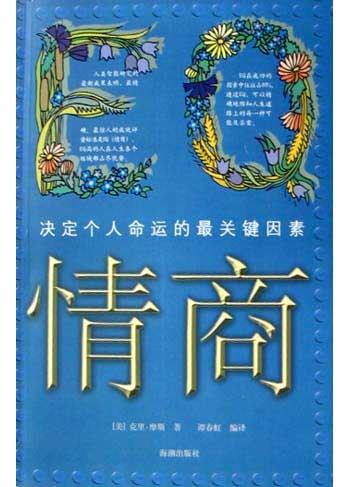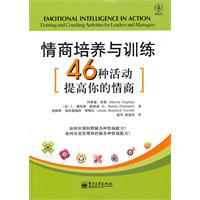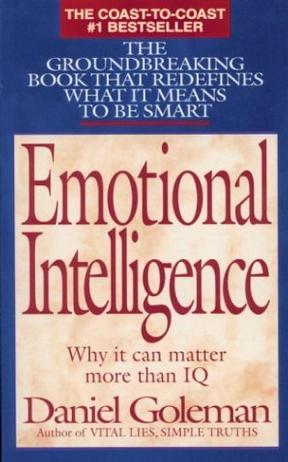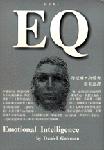-

EQ情商
什么是情商? 1983年哈佛大学心理学家霍华德·加德纳在《精神状态》一书中提出,人有“多元智慧”,开启了情商学说的新智。1991年耶鲁大学心理学家彼得·塞拉维和新罕布什尔大学的琼·梅耶首创EQ情商一词。1995年《纽约时报》专栏作家丹尼尔·戈尔曼出版《情绪智力》一书,将情商推向高潮。EQ在美国掀起轩然大波,并风靡全世界。 情商概念的提出是人类智能的第二次革命,其主要观点包括:情商是个体的重要的生存能力,是一种发掘情感潜能、运用情感能力影响生活各个层面和人生未来的关键的品质因素。一个人在社会上要获得成功,起主要作用的不是智力因素,而是他们所说的情绪智能,前者占20%,后者占 80%。 本书在总结现有情商理论的基础上,提炼出一套简单有效、实用可行的训练方法。通过阅读和训练,能大大地提升个人的EQ指数,从而在个人生活和职业生涯中获得成功。 -

情商培养与训练
本书围绕情商评价方法中核心的15种情商能力,提供了46种训练活动。通过这些训练活动,学习者不但可以深入理解每种情商能力,而且可以挖掘和创造自身潜能,培养高效的情商能力。这些训练活动可以单独使用,也可以作为领导和管理培训方案中的一部分。活动提供了供学习者亲身实验的体验式学习方案,已经被证明能够充分提升学习者的情商能力。这些训练活动适用于巴昂的EQ-i和EQ-360,戈尔曼和博亚兹的ECI 360,梅耶、萨洛维和卡罗素的MSCEIT以及奥里奥里和库珀的EQ Map四种评价方法。 -

Emotional Intelligence
在线阅读本书 Is IQ destiny? Not nearly as much as we think. This fascinating and persuasive program argues that our view of human intelligence is far too narrow, ignoring a crucial range of abilities that matter immensely in terms of how we do in life. Drawing on groundbreaking brain and behavioral research, Daniel Goleman shows the factors at work when people of high IQ flounder and those of modest IQ do well. These factors add up to a different way of being smart -- one he terms "emotional intelligence." This includes self-awareness and impulse control, persistence, zeal and self-motivation, empathy and social deftness. These are the qualities that mark people who excel in life, whose relationships flourish, who are stars in the workplace. Lack of emotional intelligence can sabotage the intellect and ruin careers. Perhaps the greatest toll is on children, for whom risks include depression, eating disorders, unwanted pregnancies, aggressiveness and crime. But the news is hopeful. Emotional intelligence is not fixed at birth, and the author shows how its vital qualities can be nurtured and strengthened in all of us. And because the emotional lessons a child learns actually sculpt the brain's circuitry, he provides guidance as to how parents and schools can best use this window of opportunity in childhood. The message of this eye-opening program is one we must take to heart: the true "bell curve" for a democracy must measure emotional intelligence. 点击链接进入中文版: 情商:为什么情商比智商更重要 -

情商
《情商》中,你将全面了解情商的意义和发挥作用的方方面面,以及怎样运用情商来完善自己的性格以及在竞争中取胜。包括:培养自我的核心价值:利用情商击败愤怒情绪:培养沟通技能,工作中所需要的情商:两性关系中所需的情商,培养孩子情商的技巧等。 -

Emotional Intelligence
Everyone knows that high IQ is no guarantee of success, happiness, or virtue, but until Emotional Intelligence, we could only guess why. Daniel Goleman's brilliant report from the frontiers of psychology and neuroscience offers startling new insight into our "two minds"--the rational and the emotional--and how they together shape our destiny. Through vivid examples, Goleman delineates the five crucial skills of emotional intelligence, and shows how they determine our success in relationships, work, and even our physical well-being. What emerges is an entirely new way to talk about being smart. The best news is that "emotional literacy" is not fixed early in life. Every parent, every teacher, every business leader, and everyone interested in a more civil society, has a stake in this compelling vision of human possibility. -

EQ - Emotional Intelligence
什麼是EQ? 無數心理學家的研究已經指出,過去用以評量個人才智的標準──IQ,事實上並不足以準確預測個人未來的成就。與認識自我、管理情緒、激勵自己以及人際關係息息相關的能力──EQ,才是決定個人成功、快樂與否的關鍵。EQ不但是可以學習的,更可以從小加以培養。 本書是90年代最具影響力的話題書籍之一,不僅打破了長久以來IQ的天生決定論,更為心理學界探討已久的「情緒智能」問題提出關鍵性的解釋,出版後即在美國企業界與教育界掀起一陣EQ旋風;不但雄踞美國紐約時報暢銷書排行榜前十名達半年之久,時代與財星雜誌更以封面專輯專文介紹。 不管你是「聰明反被聰明誤」還是「傻人自有傻福」,你都不能錯過這本認識自我潛能、掌握成功之鑰的重量級好書! 目錄: 致中文版讀者序 前言 亞里斯多德的挑戰 第一部 情緒中樞 第一章 情緒的功能 * 當激情淹沒理智 * 理性與感性 第二章 情緒失控 * 神經總動員 * 情緒記憶的專家 * 情緒管理員 第二部 EQ的意涵 第三章 智人的愚行 * EQ與命運 * 另一種智力 * 情緒可以是聰明的嗎? 第四章 認識自己 * 激情與淡漠 * 沒有感覺的人 第五章 激情的奴隸 * 解析憤怒 * 怒上加怒 * 發洩有效嗎? * 新憂解舊愁 * 換個心情 * 拒絕悲觀的人 第六章 整體性向 * 糖果試驗 * 潘朵拉的盒子 * 神馳 第七章 同理心的根源 * 敏感的孩子 * 情感失調 * 犯罪心理 第八章 社交技巧 * 感染力 * 基本社交智能 * 變色龍 * 「我們討厭你」 第三部 EQ的應用 第九章 親密的敵人 * 他與她 * 「你根本不了解」 * 婚姻問題模式 * 無言的對話 * 情緒決堤 * 男人,你的名字是弱者 * 愛也需要練習 第十章 用「心」管理 * EQ的企業成本效益 * 錯誤的激勵方式 * 偏見的根源 * 對不寬容的人絕不寬容 * 溝通網、專業網、人緣網 第十一章 心靈與醫藥 * 情緒與健康 * 致命的憤怒 * 沮喪的代價 * 快樂的醫學效益 * 人際關係的醫療價值 * 關懷的醫學 第四部 改變的契機 第十二章 家庭的試煉 * 從心做起 * 打好EQ的根基 * 壞小孩 第十三章 創傷與二度學習 * 凝結的恐怖記憶 * 邊緣系統的疾病 * 情緒再教育 * 創傷與復原 第十四章 性格不等於命運 * 從神經化學看害羞 * 無可救藥的樂天型 * 童年是希望之窗 第五部 情緒識字率 第十五章 情緒文盲 * 世紀瘟疫 * 侵略性格 * 惡霸學校 * 向沮喪說不 * 憂鬱的年代 * 留白的青春 * 飲食失調 * 酗酒與吸毒 * 戰鬥不如止戈 第十六章 情緒教育 * 合作訓練 * 一場打不起來的架 * EQ初階 * 隱性情緒教育 * 情緒識字率 * 人格、道德與民主 附錄 1. 何謂情緒? 2. 情緒心靈的特徵 3. 恐懼的神經機轉 4. 青少年問題防患計畫的重點 5. 自我科學班的課程內容 6. 情緒與社會能力的學習效果